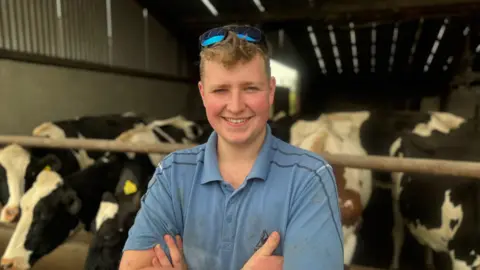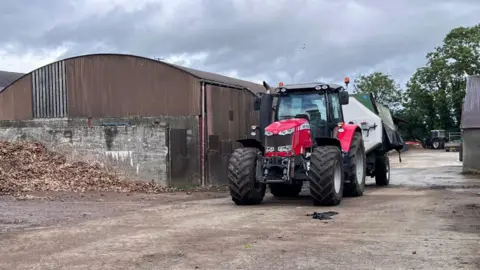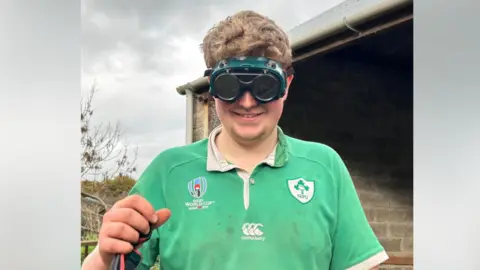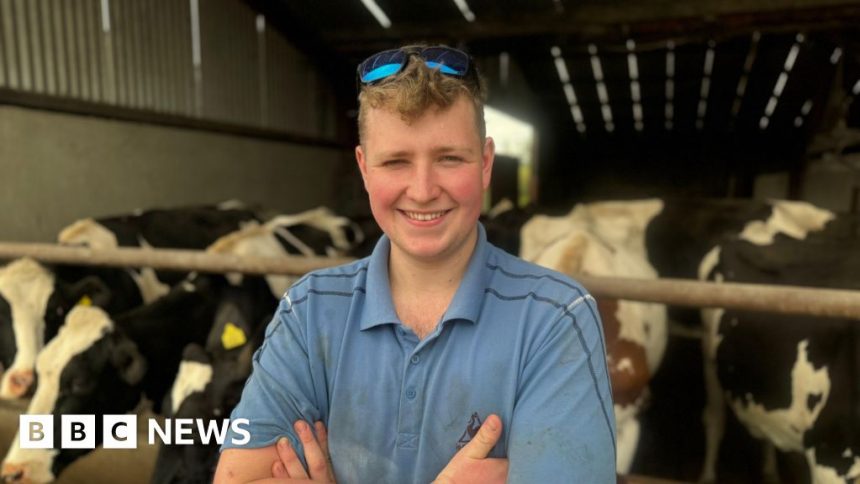Farmer champions safety after life-changing injury
 BBC
BBCA young farmer from County Londonderry who lost his sight in one eye in a farm accident has told BBC News NI that it will not stop him doing what he loves.
Ryan Taggart, 21, was working for an agricultural contractor in Shropshire when he suffered the life-changing injury.
He was 19 when he was hit in the eye with a small piece of metal while working on machinery.
New figures from the Health and Safety Executive NI (HSENI) show that eight people were killed on Northern Ireland’s farms between April 2023 and March 2024. In GB, 27 people were killed in agricultural-related activities, according to the HSE.
‘You think it could never happen to you’
Warning: Distressing image below
“I was changing the shoe of a sub-soiler and I took the roll pin out and the shoe wouldn’t come off, so I hit it with a hammer,” Mr Taggart told BBC News NI.
“A bit of metal fragmented off the shoe and went into my eye.”
The shrapnel cut through Mr Taggart’s eye, scarring the retina.
He says he is only able to make out shapes and light in his right eye, but is “very lucky” not to have lost his eye.
“You think it could never happen to you, but at the end of the day things like this do happen to people,” he said.
 Ryan Taggart
Ryan Taggart This week marks the 12th year of Farm Safety Week, an annual campaign organised by the Farm Safety Foundation (Yellow Wellies) across the UK and Ireland.
HSE NI said almost 50% of the reported work place deaths in 2023/2024 were farm related.
Robert Kidd, chief executive of HSENI says that while every death is an “absolute tragedy”, over the last 12 years “the figures are much improved”.
“We have seen years where there were more young people died as a result of accidents,” he added.
“Thankfully, in the last couple of years that has been greatly improved, but we are still aware that there’s a lot to be done and certainly eight fatalities last year is hugely disappointing.
“The contribution farming makes both to the economy and to a rural community is is very important and we don’t want to see any loss or any families grieving.”
‘Why should it stop me doing what I love?’

After several surgeries, Mr Taggart has continued to work full-time in farming, and returned home last year to work on his uncle’s dairy farm outside Kilrea.
While the accident means he “looks at life in a different way”, a career change was never really an option.
“It took me a while to get over it, but you don’t want to stop doing something you love,” he said.
“You just have to deal with it.
“I don’t think anyone could have stopped me from doing it.
“Why should it stop me doing what I love?” he said.
“It happened me when I was 19 years old; if I get another 60 years I’ll be doing well.
“There’s no point looking back when you’ve your whole life to look forward to.”
Lessons can be learned
Mr Taggart says he made “a lot of adjustments” after his accident and is now risk aware.
The 21-year-old believes farmers can learn from people working in other sectors, such as construction.
“Farming is normally seen as a family business and it’s not looked at as a proper business which creates added risk,” he said.
 Ryan Taggart
Ryan TaggartConcern for older farmers
HSENI said “farming is a unique situation” compared to other industries with young people often living in the workplace and people working beyond retirement age.
Mr Kidd said they were particularly concerned about the amount of older people being killed on farms with the youngest fatality last year in their 60s and some in their 70s and over 80.
“It suggests there might be a complacency or perhaps that farmers are thinking they’re still as able as they were 30-40 years ago and they’re just not as quick and agile.
“We’re now putting a big focus on those older farmers.”
Analysis: Louise Cullen, BBC News NI environment correspondent
Ryan’s story shows how a split-second decision can have long-lasting consequences.
Despite his sight loss, he is lucky.
Eight deaths in a year are still eight too many, and life-changing injuries can affect more than the person who suffers them.
Farms are not like other businesses – almost 80% of the 26,131 in Northern Ireland are classed as very small, run by families.
And that often means one farmer working alone with no staff and certainly no health and safety officer or risk assessor.
Sometimes there isn’t anyone to help with tasks on the farm which can heighten the risk when working with animals, equipment, slurry or at a height.
The ageing profile of farmers – now on average in their late 50s – also brings its own challenges.
So campaigns like Farm Safety Week still play a part in saving lives.






